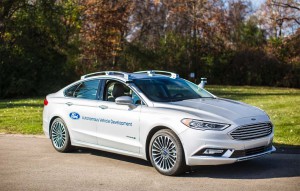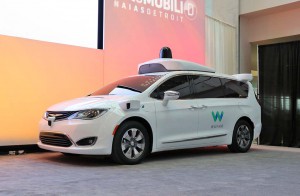In the race to put autonomous vehicles on the road, it’s not always those who were quick out of the gate who are taking the lead, finds a new study.
Ford Motor Co., which initially took a slow and cautious approach to self-driving technology, is now in the lead, according to Navigant Research, a firm that closely follows the development of high-tech automotive hardware and software.
Like “many traditional OEMs,” said the Navigant study released today, Ford was “skeptical about the commercial prospects for automated driving,” but it has shifted its efforts into high gear since Mark Fields became CEO in mid-2014, and has since been making aggressive moves “through a combination of strategic investments and development of supporting business models.”
That approach has played out for several other automakers, including Ford’s cross-town rival General Motors, as well as Daimler AG and the Renault-Nissan Alliance, that Franco-Japanese partnership one of the original pioneers in autonomous technology.
The Navigant study looked at both traditional automakers as well as newer entrants – both car manufacturers like Tesla, and tech firms such as Google’s Waymo and ride-sharing giant Uber. In turn, their research efforts were judged along 10 different criteria including not only their execution of self-driving technology but the strategies each company has developed to actually put self-driving vehicles on the road.
(Waymo, Uber go to court over alleged theft of autonomous vehicle tech. Click Here for the latest.)
As a result, there were some notable surprises in the study. Waymo, the Google spin-off, has long been hailed as the leader in autonomous technology, and according to Navigant researcher Sam Abuelsamid, it remains a formidable force there, backed up by a fast-growing fleet of self-driving prototype vehicles that have clocked millions of miles on the road over the past seven years.
“On the tech side (Waymo) gets a very high score,” Abuelsamid told TheDetroitBureau.com. “But what they don’t have is a production strategy. They don’t have a pathway to produce vehicles or distribute them.”
CEO John Krafcik has largely ruled out Waymo building its own vehicles. It has teamed up with Fiat Chrysler Automobiles to purchase and outfit 100 Pacifica Hybrid minivans to use the tech giant’s latest autonomous technology, and recently announced a project with Honda. But, to date, Waymo has not developed any process to come to market.
For its part, Ford was actually a relatively early player in autonomous technology, first launching a development program 11 years ago. But, under former CEO Alan Mulally, it was a low-priority project. Under CEO Fields, who is trying to position the carmaker as a “mobility company,” that has changed dramatically. Ford announced the $1 billion acquisition of Pittsburgh-based Argo AI, an autonomous tech firm, in February, and has launched a number of ride- and vehicle-sharing programs that could provide an outlet for self-driving technology.
(Why is Ford spending $1bil for Argo AI? Click Here to find out.)
General Motors has taken a similar approach, including the $1 billion purchase of Cruise Automation, an autonomous development company in San Francisco, and a $500 million investment in ride-sharing firm Lyft.
The authors of the Navigant study see a link-up with ride-sharing companies as a critical development. Like a number of other researchers, they are skeptical about whether – or when – autonomous vehicle technology will actually show up on the retail market. The concern is that this could create unacceptable levels of liability because it would be difficult to ensure owners maintain their vehicles properly. Modifications and improper repairs could cause failures that automakers might wind up being held financially liable for, said Navigant’s Abuelsamid.
There is a growing consensus that, at least initially, self-driving vehicles will debut in ride-sharing fleets where automakers will be more confident about maintenance and repairs.
Ford, in particular, announced last year that it is aiming to go to market with the most advanced version of autonomy, so-called Level 5 vehicles that would be able to operate in all locations and conditions without having even a backup driver ready to take control in an emergency. It also said it will specifically target sharing fleets and delivery services.
Between 2015 and now, Ford jumped from sixth place to take the lead in the latest Navigant study. And Abuelsamid conceded that the state of development is “absolutely” fluid. Who will be on top when the research firm conducts its next state-of-the-art study in 2018 is anyone’s guess.
What is clear is that the auto industry is investing billions to get autonomous vehicles on the road. But how soon that will happen is also a bit fuzzy. Renault-Nissan has set a 2020 target. Tesla wants to get there even sooner, and has been regularly updating its semi-autonomous Autopilot system as a prelude to full autonomy. For its part, Ford says its first driverless vehicles will be ready by 2021.
Not everyone accepts those aggressive targets – and recent experience shows why skepticism is abundant. Within the last two weeks, self-driving prototypes operated by both Uber and Tesla have been involved in crashes. Though no one was injured in either case, the two incidents show the challenges of programming vehicles to react to all real-world conditions, including those where human drivers make mistakes.
Now add the challenge of getting regulators to come up with the necessary rules and the need for companies to develop viable business plans. This is an aggressive race, but even the finish line hasn’t been fixed in place yet.
(Uber autonomous car crashes in Arizona. Click Here for the story.)



